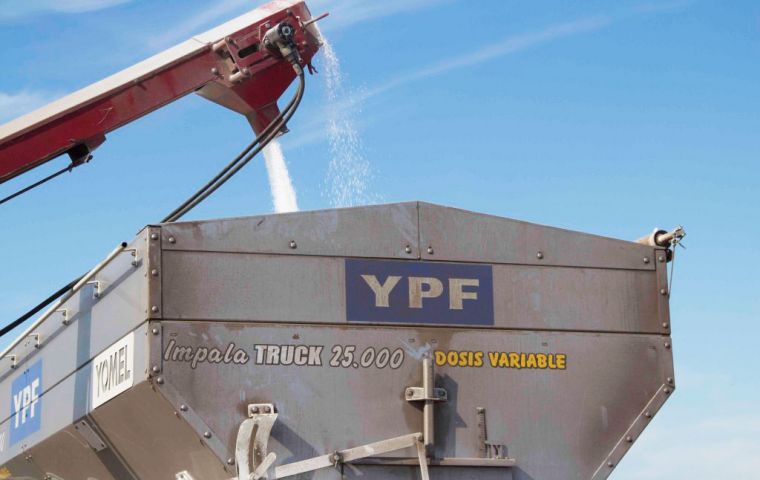MercoPress. South Atlantic News Agency
Argentine farmers investing heavily for the next planting season following on a record crop year
 Sales of fertilizer will grow to 3.9 million tons in 2017, up 8% from the prior year, according to Fertilizar, an agrochemical industry group.
Sales of fertilizer will grow to 3.9 million tons in 2017, up 8% from the prior year, according to Fertilizar, an agrochemical industry group. Argentine farmers will increase investments in the next corn planting season despite fears about a political comeback for former President Cristina Fernandez, who implemented export taxes and restrictions despised by the sector, according to industry leaders.
Several polls show Fernandez in the lead for a Senate seat in politically crucial Buenos Aires province in October's legislative election, which could determine the future of President Mauricio Macri's free-market agenda. A primary vote will take place on Sunday.
Sales of fertilizer will grow to 3.9 million tons in 2017, up 8% from the prior year, according to Fertilizar, an agrochemical industry group. Farmers have also stepped up purchases of advanced-technology corn seeds, according to Argentina's ASA seed producers association.
Since taking office in late 2015, Macri has eliminated export taxes and restrictions on corn and wheat, leading to record-high harvests. Cristina Fernandez clashed with the economically key agriculture sector over her interventionist policies during her two terms in office from 2007-2015.
The specter of her political return has spooked investors. But that has had little impact on farmers, who are banking on policy stability at least through next year's harvest.
Planting for the 2017/18 summer crop starts in September, with harvests beginning in March.
According to the Buenos Aires grains exchange, public policies favorable to the agricultural sector helped boost the 2016/17 crop to a record-high 39 million tons, above the previous volume of 30 million tons.




Top Comments
Disclaimer & comment rules-

-

-

Read all comments“The specter of [CFK's] political return has spooked investors. But that has had little impact on farmers, who are banking on policy stability at least through next year's harvest. ”
Aug 10th, 2017 - 02:59 pm 0In Argentina, “policy stability” is considered exotic, and a one-year planning horizon is about as good as it gets.
Reekie must be periodically reminded that it was the CFK government that torpedoed purchasing power in this country long before the Macri government.
Aug 12th, 2017 - 02:32 am 0Argentina allowed the peso to devalue by 17% on January 23, 2014, from $6.8 to over $8.0. Which of course meant that prices went up. Particularly for imported goods, because what passes for argie-manufactured goods in this country is not the sort of thing you'd buy if you had a choice. So a lot of items went up in price by a great deal more than the percentage of the currency devaluation. As in price increases of 40 to 50 percent.
Sample products - costs before and after the devaluation:
Bottle Sterilizer – 899 pesos
Bottle Warmer – 599 pesos
Same items after January 2014 devaluation
Same Bottle Sterilizer – 1401 pesos
Same Bottle Warmer – 721 pesos
It's rather interesting that peso prices for similar products, imported and domestic, have not been affected this year anywhere near as badly as they were during CFK's 2014 devaluation.
The deficit spending we are still seeing in this country is a continuation of the far-worse free-spending of the KK years.
Despite what reekie would have you believe, things were not rosy under the Kirchner regime.
Reekie,
Aug 15th, 2017 - 12:46 am 0“Difficult to see any light at the end of this tunnel.”
It seems that you are now in a small minority who believes this. Oh dear.
Commenting for this story is now closed.
If you have a Facebook account, become a fan and comment on our Facebook Page!